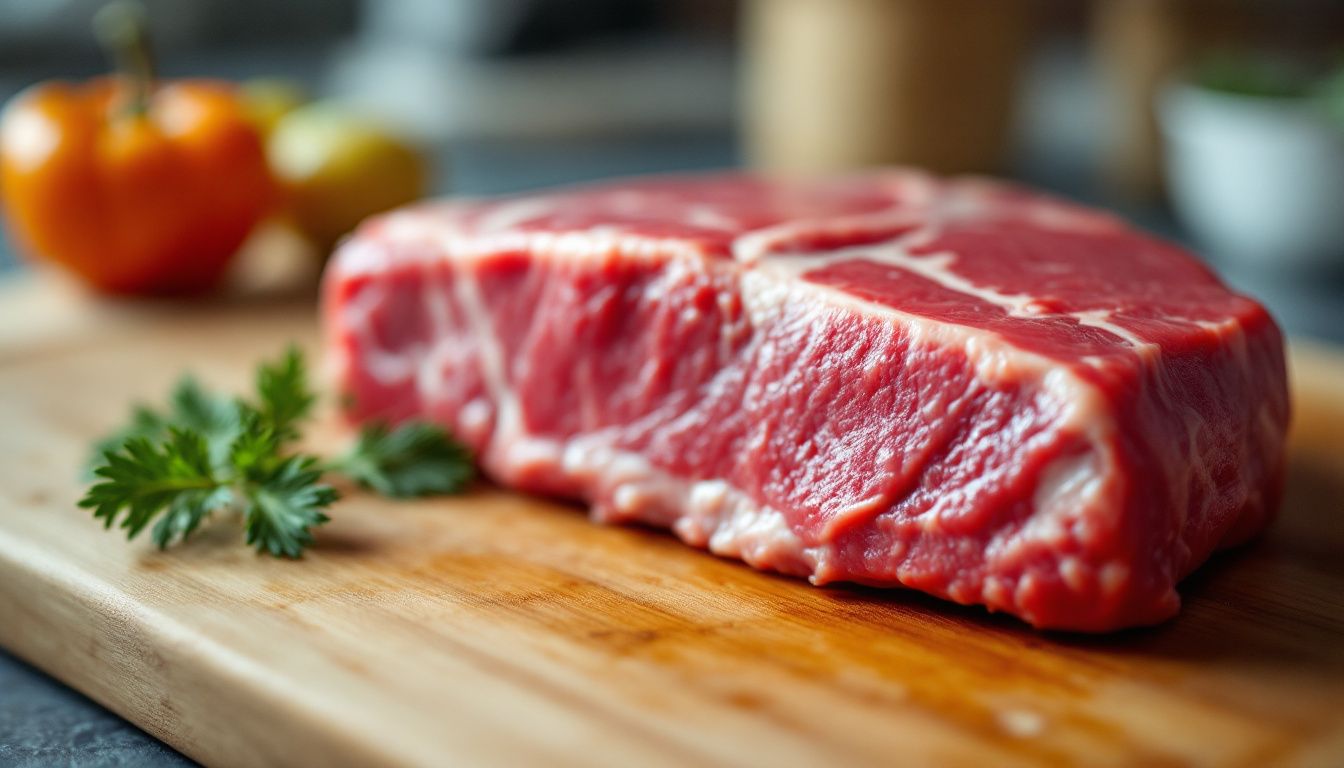Many people wonder if eating meat is healthy or harmful. Red meat provides protein, Vitamin B12, and other key nutrients like iron. But studies link high consumption of processed meats to diseases like heart disease and colorectal cancer.
Thank you for reading this post, don't forget to subscribe!This blog will help you understand the facts—both benefits and risks of meat. Keep reading!
Key Takeaways
- Red meat is high in protein, Vitamin B12, zinc, and heme iron, which helps absorb nutrients better than plant-based sources.
- Eating processed meats daily can increase heart disease risk by 15% and type 2 diabetes risk by 30%.
- Processed meats are linked to colorectal cancer; the WHO suggests cutting back on these for better health.
- Limit red meat intake to 18 ounces per week or smaller portions; try lean options like pork tenderloin or grass-fed beef.
- Replace red meat sometimes with chicken, fish, beans, or tofu for a balanced diet. Avoid grilling to reduce harmful chemicals (PAHs/HCAs).
The Nutritional Value of Meat

Meat is packed with essential nutrients needed for the human diet. A 3-ounce serving of red meat offers 45% of the daily value (DV) for protein and 35% of the DV for vitamin B12. It also contains zinc, selenium, heme iron, and other vitamins and minerals that support overall health.
Heme iron in meat helps your body absorb iron more efficiently than non-heme iron from plant sources.
Lean meats like grass-fed beef or lean beef provide nutrition without excessive saturated fat intake. Red meats such as lamb, pork, or goat are rich in proteins vital for muscle growth and repair.
White meat like chicken also delivers quality protein while being lower in fat compared to processed red meats or cured options like bacon. Adding these food sources thoughtfully can boost a healthy diet with significant benefits!
Potential Health Risks of Eating Meat
Eating red and processed meat can raise health risks. Studies show that consuming 70 grams of these meats daily may boost heart disease risk by 15% and type 2 diabetes by 30%. Processed meats, with added chemicals during curing or salting, pose even greater dangers.
They are linked to colorectal cancer and colon cancer more strongly than unprocessed meat. The World Health Organization advises cutting back on red and processed meat due to their connection with cancers like colorectal cancer.
Heme iron in red meat impacts the gut microbiota, which may lead to negative effects over time. Long-term consumption of such meats has been tied to ischemic heart disease, weight gain, and diverticular disease.
Cooking methods like grilling can produce harmful substances called PAHs (polycyclic aromatic hydrocarbons), adding more risk. Too much saturated fat from heavy meat consumption may harm cardiovascular health as well.
Balancing Meat in a Healthy Diet
Limit red meat to 2–3 servings a week. Experts like Dr. Hu suggest keeping portions small—such as 9 ounces twice weekly, or a deck-of-cards size six times a week. MD Anderson recommends no more than 18 ounces per week for cancer prevention.
Avoid processed meats like cured sausage and hot dogs, which increase cancer risk.
Pick lean options such as pork tenderloin or grass-fed beef for better health benefits. Try Meatless Mondays by replacing red meat with poultry, seafood, or plant-based proteins like beans and tofu.
Flavorful cooking methods like baking are safer than grilling, which can produce harmful PAHs or HCAs linked to cancer risks.
Conclusion
Meat can be both good and bad for health—it depends on how much and what type you eat. Red meat provides protein, iron, and Vitamin B12, but eating too much is linked to heart disease and cancer.
Processed meats pose even higher risks due to additives. Balancing your diet with lean proteins, whole grains, fruits, and vegetables promotes better health. Choose wisely for a healthier life!
References
- https://pmc.ncbi.nlm.nih.gov/articles/PMC8305097/
- https://www.healthline.com/nutrition/meat-good-or-bad
- https://www.news-medical.net/health/What-Are-the-Negative-Health-Effects-of-Eating-Meat.aspx (2021-11-17)
- https://pubmed.ncbi.nlm.nih.gov/26780279/
- https://www.betterhealth.vic.gov.au/health/healthyliving/Meat-and-poultry
